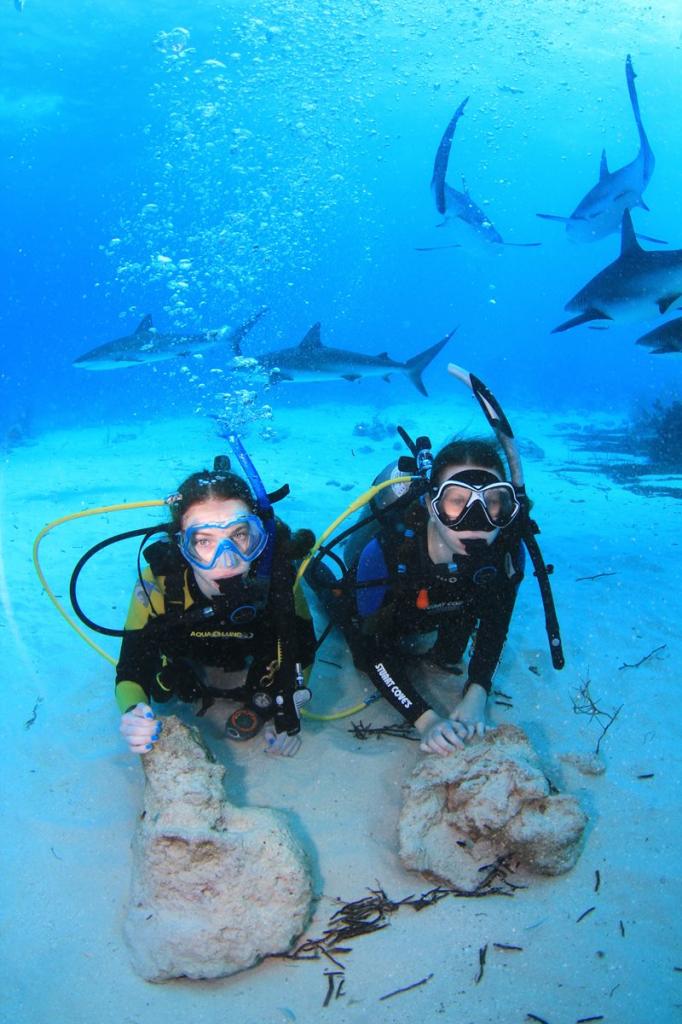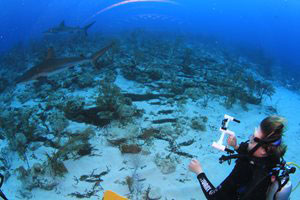TIDES Fieldwork in the Bahamas
Ocean First Jul 01, 2022

 Thanks to movies and sensationalized news, sharks have a bad reputation for being bloodthirsty creatures. During a recent TIDES trip to the Bahamas, 15 middle schoolers from Kent Denver had the opportunity to come face to face with the misperception and emerged with a new appreciation for sharks and their place in the ecosystem.
Thanks to movies and sensationalized news, sharks have a bad reputation for being bloodthirsty creatures. During a recent TIDES trip to the Bahamas, 15 middle schoolers from Kent Denver had the opportunity to come face to face with the misperception and emerged with a new appreciation for sharks and their place in the ecosystem.
TIDES is a multi-year program developed in part by Ocean First Education for 7th -12th graders that combines rigorous interdisciplinary science curriculum, hands-on learning, and confidence-building scuba training to unlock students' natural curiosity and passion for the ocean. The middle schoolers who traveled to the Bahamas were in their second year of the TIDES program and were on the trip to conduct field work.
The Bahamas expedition was a collaborative effort. Mark Duvall, scuba instructor at Ocean First, helped prepare the students by leading them through SSI's new Shark Ecology course, as well as Nitrox, Navigation, Digital Underwater Photography, and Perfect Buoyancy. Dr. Mikki McComb-Kobza, Executive Director of the Ocean First Institute and author of the Shark Ecology course, joined the trip as the resident shark expert. Kent Denver's science teachers, Chrissy Frederick and Steve Newman, lent a helping hand in keeping the whole operation running smoothly, and Stewart's Cove dive shop employees were invaluable in coordinating and assisting in all of the diving.
The week-long trip included 14 dives, plenty to get the students oriented, complete their certifications, and conduct underwater research. Clear water and an abundance of fish, rays, turtles, and healthy coral made for some incredible memories. Five of the dives were spent at the shark wall, shark arena, and shark pavilion with dozens of nurse and Caribbean reef sharks. On two dives, sharks were hand fed by Stuart Cove's trained staff and were swimming amongst the excited students. Under the mentorship of Dr. Mikki, students were able to measure sharks using a technique called twin laser photogrammetry. The measuring tool was developed by students from the St. Vrain Valley Innovation Center and was the research focus of the trip. Students have the opportunity to analyze the footage and make the calculations to determine each sharks length and weight. While there was immense trepidation to jump into water with sharks on the first dive, the students' fears were quickly dispelled as they witnessed the sharks innocently ignoring the humans as they ate their food. An exciting note: the SSI Shark Ecology course was so new that these students were actually the first people in the world to become certified in this specialty!
 Middle schoolers are at a transitional part of their lives, stuck between youthful enthusiasm and a disinterest in authority. In their short time away, there was tremendous growth in the students’ maturity and attitudes towards both ocean animals and themselves. They quickly learned to depend on one another when they found themselves sitting in a group on the seafloor and surrounded by sharks. For the Ocean First staff, being able to mentor students over several years on multiple trips is deeply rewarding. They are able to witness their maturity and growing connection to the ocean.
Middle schoolers are at a transitional part of their lives, stuck between youthful enthusiasm and a disinterest in authority. In their short time away, there was tremendous growth in the students’ maturity and attitudes towards both ocean animals and themselves. They quickly learned to depend on one another when they found themselves sitting in a group on the seafloor and surrounded by sharks. For the Ocean First staff, being able to mentor students over several years on multiple trips is deeply rewarding. They are able to witness their maturity and growing connection to the ocean.
As a part of their TIDES journey, some of the students on the Bahamas had been on previous trips to either Puerto Adventuras, the Florida Keys, or Grand Cayman, and next year some lucky teenagers will get to explore a new region of the big blue in the Galapagos. We are told that their experiences with TIDES are magical and life-changing and the ocean stewardship that these young adults will carry into adulthood will hopefully affect the ocean for the better.
Here's what some of the students had to say about their time in the Bahamas:
Chloe D, age 12:
"I would do this trip again if I could, I loved the dives, our instructors were amazing and the research information we gathered was incredible."
Shannon B:
"Living in Colorado, it is challenging to find ways to enhance your diving education and become certified in more courses. This week long trip we took to the Bahamas helped solve this problem by enabling us to become certified in shark diving, nitrox, and navigation. With fourteen dives, we had plenty of time to focus on these courses and practice what we had learned."
 On what Shannon learned about sharks:
On what Shannon learned about sharks:
"With their poor eyesight, nurse sharks rely on movements for sight, while reef sharks rely on their eyesight. At one point, a nurse shark was stunned, so he quickly turned away and because divers are not supposed to move during a feeding dive, he didn’t see me and rammed into my head. This was the first moment when I truly felt no fear for sharks. The shark hit me, but continued on as if nothing happened."
Jack H, 7th grade:
"Before this trip I was scared to death of sharks, but then seeing the sharks circling us in feeding mode and not even paying attention to us changed my perspective: sharks are simply predators at the top of the oceanic food chain, just like lions, and we do not make big movies about lions slaughtering humans. At the end of this trip we all got certified in the shark course, and we were the first people in the world! This trip changed my life. It was simply amazing."
Davis E:
"Going to the Bahamas for school was truly an incredible experience. I was given the opportunity to dive with reef sharks and measure them. This was probably one of the coolest things I had ever done because before this trip I was not very fond of the idea of being with lots of sharks. But as I got in the water, I realized that the sharks were not out to get you, but really just go on with their lives. I now have no problem getting in the water with the sharks and just think of it as a normal part of diving."
Jimmy F:
"I learned about many different coral; a personal experience was when I accidentally touched fire coral. Although it didn't feel so great it was nice to learn about the coral and what it looks like so I don't touch it again."
Jack D:
"During my trip to the Bahamas my bias against sharks was destroyed. When diving with sharks I observed a resemblance in their behavior to that of puppies. In addition to measuring sharks, we also did fish surveys and submitted our data to a website that keeps track of fish populations."
Sander S:
"During the trip to the Bahamas, I learned just how important the ocean and all of its components are. The coral provides as homes for fish who in return eat the algae, or clean the coral to prevent it from dying. Sharks, barracudas, grouper, and other fish prevent some species from overpopulation."
Will M:
"At first looking from the surface at a shark, I saw a deadly beast. This is the unfortunate stereotype that sharks have. Once I had the experience to dive with sharks, I realized they are very friendly, safe, curious and playful creatures. The best part about my trip was learning that sharks are not a threat, they are our friends."
